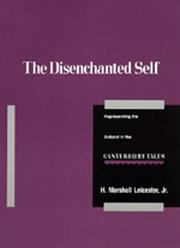| Listing 1 - 1 of 1 |
Sort by
|

ISBN: 0520068335 0520067606 0520909771 058530596X 0520341244 Year: 1990 Publisher: Berkeley, CA : University of California Press,
Abstract | Keywords | Export | Availability | Bookmark
 Loading...
Loading...Choose an application
- Reference Manager
- EndNote
- RefWorks (Direct export to RefWorks)
The question of the "dramatic principle" in the Canterbury Tales, of whether and how the individual tales relate to the pilgrims who are supposed to tell them, has long been a central issue in the interpretation of Chaucer's work. Drawing on ideas from deconstruction, psychoanalysis, and social theory, Leicester proposes that Chaucer can lead us beyond the impasses of contemporary literary theory and suggests new approaches to questions of agency, representation, and the gendered imagination. Leicester reads the Canterbury Tales as radically voiced and redefines concepts like "self" and "character" in the light of current discussions of language and subjectivity. He argues for Chaucer's disenchanted practical understanding of the constructed character of the self, gender, and society, building his case through close readings of the Pardoner's, Wife of Bath's, and Knight's tales. His study is among the first major treatments of Chaucer's poetry utilizing the techniques of contemporary literary theory and provides new models for reading the poems while revising many older views of them and of Chaucer's relation to his age.
Christian pilgrims and pilgrimages in literature --- Tales, Medieval --- Self-consciousness (Awareness) in literature --- Poetry --- Subjectivity in literature --- Point-of-view (Literature) --- Persona (Literature) --- Self in literature --- English Literature --- English --- Languages & Literatures --- History and criticism --- Psychological aspects --- Characters and characteristics in literature --- Rhetoric --- Fiction --- Narration (Rhetoric) --- Poems --- Verses (Poetry) --- Literature --- Self-consciousness in literature --- Medieval tales --- Technique --- Philosophy --- Chaucer, Geoffrey, --- agency. --- canterbury tales. --- character oriented. --- chaucer. --- chivalry. --- critical theory. --- deconstruction. --- despairing self. --- disenchanted consciousness. --- dramatic principle. --- feminine imagination. --- gender studies. --- gendered imagination. --- institutional critique. --- knighthood. --- language. --- masculine imagination. --- pilgrims. --- practical consciousness. --- psychoanalysis. --- recovering the subject. --- representation. --- self presentation. --- sex and gender. --- social theory. --- subjectivity. --- the knights tale. --- the pardoners tale. --- wife of bath.
| Listing 1 - 1 of 1 |
Sort by
|

 Search
Search Feedback
Feedback About UniCat
About UniCat  Help
Help News
News